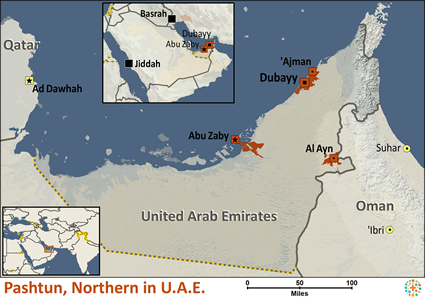The Pashtun are quite possibly the largest Muslim tribal society in the world. There are at least 30 major tribes and countless sub-tribes and clans. Pashtun identity is based on four elements: Heritage (descent from a common ancestor); Islam (99.9% Muslim); the Pashtunwali Code of Honor ("The Way of the Pashtun"); and to some extent, Language (Pakhtu or Pashto). They live primarily in Afghanistan and Pakistan, though there is a significant Pashtun diaspora in the Arab Gulf, especially the UAE.
Efforts to reach the Pashtun began in 1818 when William Carey translated parts of the Old Testament into Pakhto. The first intentional mission to the Pashtun was launched by the Church Missionary Society in Peshawar, Pakistan in 1853. This was followed by over 150 years of faithful witness through mission hospitals, schools, colleges, literature, friendship evangelism, and other forms of witness by national Pakistani (Punjabi) Christians and expatriate missionaries. Despite a slow but growing number of Pashtun believers, a vibrant, indigenous, disciple-making movement has yet to take root and spread.
A Pashtun's primary loyalty is to his particular social group (tribe or sub-tribe). The Pashtun ruled Afghanistan for over 250 years.
There is a large Afghan population in the UAE, mostly made up of construction workers and other low-level, blue-collar workers. About one-fifth of them, however, are businessmen. A high number of them came as refugees in the 1980s during the Soviet invasion of Afghanistan. The UAE is a popular destination for Pashtun refugees because of the opportunities they find there.
The Ossetians in Türkiye are primarily integrated into the larger Turkish society. In rural areas like Yozgat, they maintain traditional village lifestyles, with farming and animal husbandry as common occupations. In urban centers such as Istanbul and Ankara, Ossetians work in a variety of professions, including business, trade, and public service.PRGRPHWhile they strive to preserve their language and customs, the Ossetian language is gradually declining, particularly among younger generations due to pressures of assimilation and urban migration. In the remaining Ossetian villages, cultural events, festivals, and music continue to showcase their heritage. However, fewer individuals actively speak Ossetian dialects today.
Christian materials in Ossetian dialects are limited, making outreach efforts challenging. While some audio gospel messages and Scripture are available in Russian and Georgian, there are currently no widely known Ossetian-language Bibles in Türkiye.
Pray for the production and distribution of gospel materials in the Pashto language.
Pray for vibrant Christians to live among the Pashtuns, giving them the opportunity to tell them about Jesus Christ.
Pray for God's Spirit to strengthen and protect new believers and empower them to take Christ to other Pashtun communities.
Pray for a movement to Christ among the Pashtuns in the UAE that will spread far and wide.
Scripture Prayers for the Pashtun, Northern in United Arab Emirates.
https://gulfnews.com/uae/number-of-nepalese-in-uae-steady-1.627869
| Profile Source: Joshua Project |
| Other PDF Profile |

























